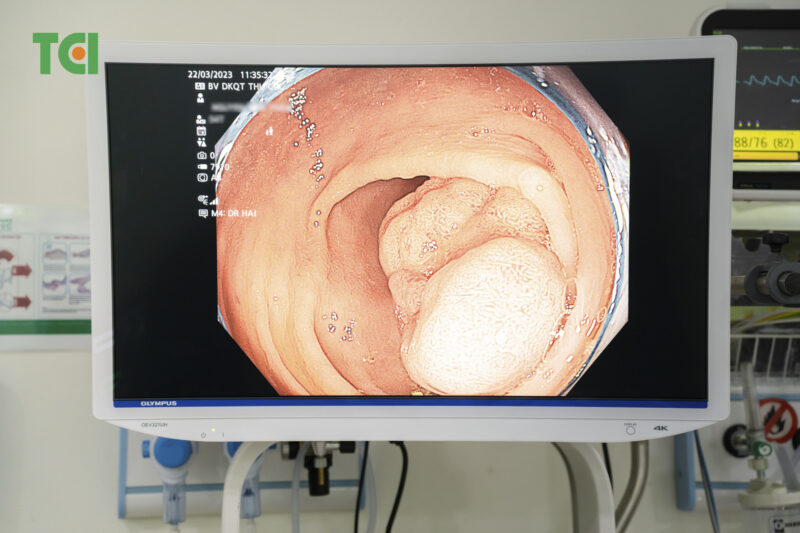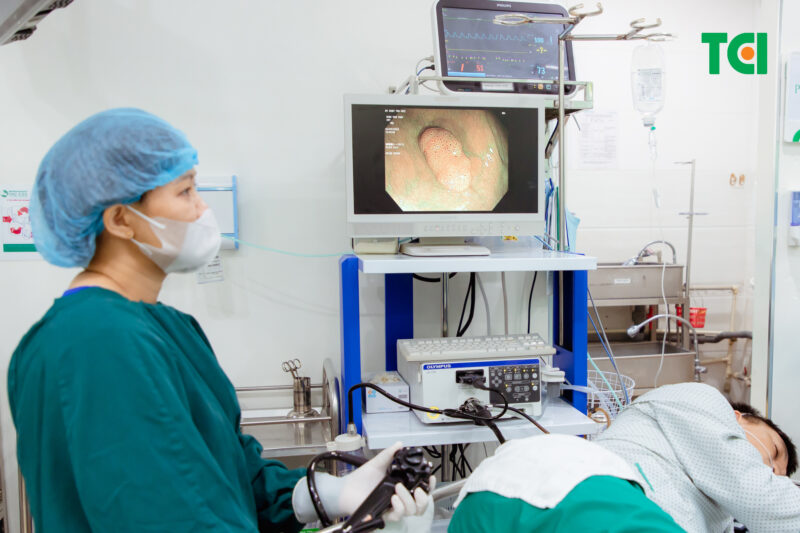Colon polyps, a common concern in gastrointestinal health, often raise many questions. People frequently wonder whether polyps are cancerous, what impacts they might have, and how they should be treated. Let’s delve into these questions to better understand colon polyps.
1. What Are Colon Polyps? Causes of Polyp Formation
1.1. Definition of Colon Polyps
Colon polyps are protruding growths inside the colon, formed due to excessive proliferation of the colon’s mucosal layer. These polyps can be classified into two main types: pedunculated (with a stalk) and sessile (without a stalk), and they vary in size. In some cases, polyps can grow to several centimeters in diameter. A person may have a single polyp or multiple polyps simultaneously.

Colon polyps are abnormal growths that protrude from the lining of the colon.
1.2. Causes of Polyps
The exact cause of polyp formation is not clearly understood, but several risk factors can increase the likelihood of developing polyps:
– Age: Older adults are more likely to develop polyps, with an incidence rate of about 15-20% in adults and higher prevalence in those over 50.
– Previous Polyps or Cancer: Individuals who have had polyps or colorectal, ovarian, or uterine cancer before age 50 are at higher risk.
– Lifestyle Factors: Smoking, alcohol consumption, lack of exercise, and obesity can increase the risk.
– Inflammatory Bowel Disease: Conditions like ulcerative colitis and Crohn’s disease are linked to higher polyp risk.
– Family History: Having first-degree relatives (parents or siblings) with colorectal polyps or cancer increases one’s risk.
– Uncontrolled Type 2 Diabetes: Poorly managed diabetes can contribute to polyp formation.
– Genetic Factors: Some polyps are hereditary.
2. Are Colon Polyps Cancerous?
2.1. Understanding the Nature of Polyps
Polyps themselves are not tumors but can resemble tumors. Most colon polyps are benign, but some have the potential to become malignant (cancerous). Statistics show that up to 50% of colorectal cancer cases develop from pre-existing polyps. Therefore, individuals with multiple or large colon polyps should be vigilant. Early treatment of polyps can prevent gastrointestinal cancer by up to 80%. Regular screenings and check-ups are crucial, especially for those at high risk.

Fifty percent of colorectal cancer cases develop from polyps.
2.2. Types of Colon Polyps and Cancer Risk
Medical experts classify polyps into two main types: hyperplastic and adenomatous. Hyperplastic polyps generally do not have cancerous potential. In contrast, adenomatous polyps are precursors to most colorectal cancers. The larger these polyps (typically greater than 2 cm), the higher the cancer risk. It can be challenging to distinguish between hyperplastic and adenomatous polyps visually; thus, a biopsy is often necessary.
Polyps with broad bases or those that are flat and sessile have a higher malignancy risk compared to those with small or long stalks. Moreover, the presence of multiple polyps, particularly hereditary polyps, significantly increases the risk of malignancy.
3. Diagnosing Colon Polyps
To detect polyps and assess for colorectal cancer, the following diagnostic methods are commonly used:
– Colonoscopy: This is the primary and most effective diagnostic tool. It allows for accurate identification of polyps regarding their location, size, and nature. During a colonoscopy, doctors can also perform biopsies to check for malignancy and remove precancerous or early cancerous polyps immediately.
– Fecal Occult Blood Test (FOBT): Early colorectal cancer can cause bleeding, detectable through this test, even if polyps are present.
– Imaging Tests (MRI, CT): These methods are used when colonoscopy is not possible. MRI or CT scans can help in diagnosing polyps and determining the appropriate treatment plan.

Colonoscopy helps diagnose and treat polyps.
4. Treating Colon Polyps
Treatment depends on the type, characteristics, and stage of the colon polyps:
– Endoscopic Polypectomy: During a colonoscopy, doctors can use advanced techniques to remove polyps safely. This minimally invasive procedure is effective, painless, and has a quick recovery time, making it the optimal treatment for small polyps, precancerous lesions, or early-stage cancer.
– Minimally Invasive Surgery: For larger polyps or those that cannot be safely removed via colonoscopy, laparoscopic surgery may be necessary to excise the polyp-affected portion of the colon.
– Surgery: In cases of hereditary polyposis syndromes, open surgery might be required to remove part or all of the colon.
Understanding what colon polyps are and their potential to become cancerous is crucial for early intervention and prevention. While polyps themselves are not cancerous, they can develop into cancer if left untreated. Regular screenings and proactive healthcare are key to managing and mitigating the risks associated with colon polyps.








